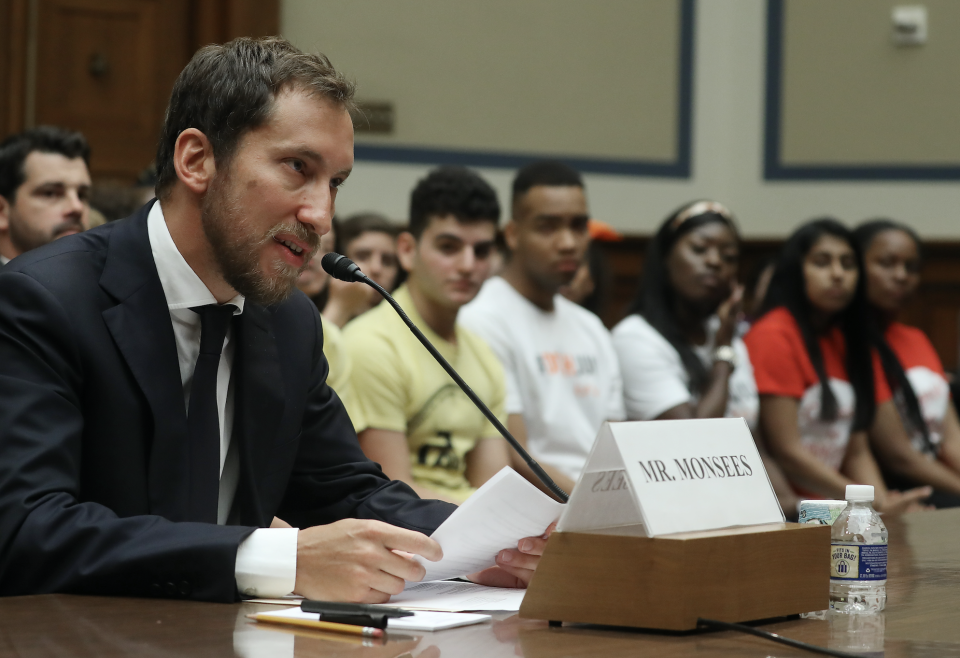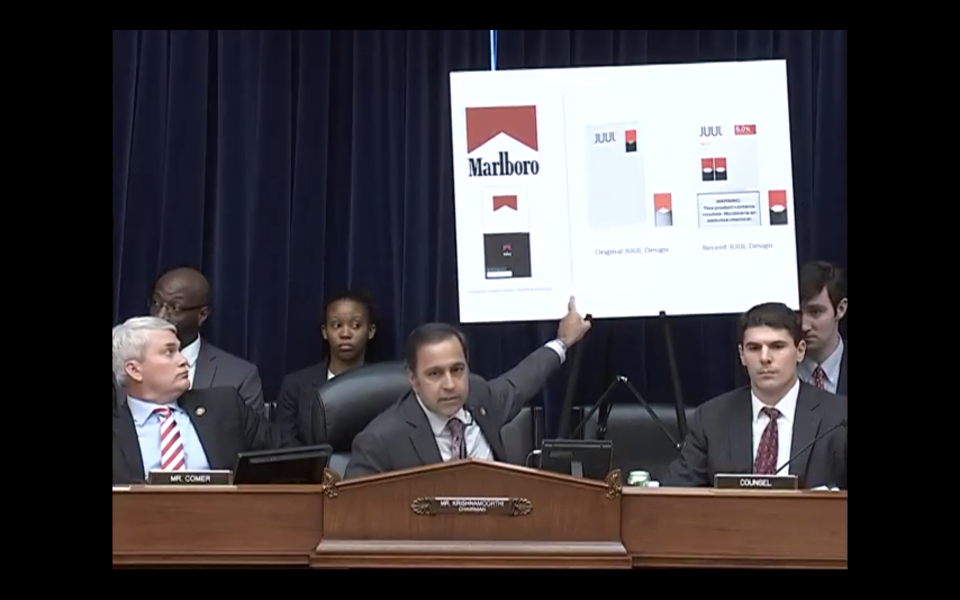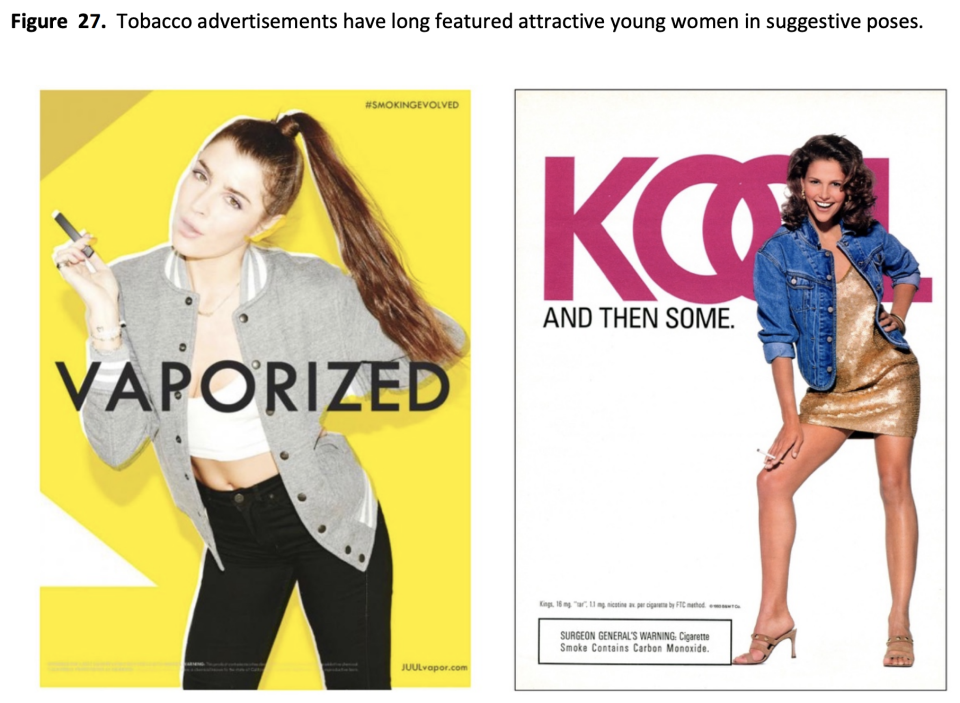Juul's CEO and a Stanford researcher, under oath, disagree on a crucial conversation
Juul Labs Co-Founder James Monsees defended the vape giant at a congressional hearing on Thursday by maintaining that he did not take a page out of Big Tobacco’s playbook with its ads, which many blame for the ensuing e-cigarette epidemic among the youth.
At one point, the hearing highlighted a crucial conversation between Monsees and a top researcher Stanford.
Congress questioned Monsees for the first time on Capitol Hill by members of the House Economic and Consumer Policy Subcommittee. Democrats plied Monsees with questions about how it framed its early ads — including how it worked with influencers — drawing on various documents procured from the company.

‘You’re under oath and you’re denying that you made that statement?’
In an interview with Yahoo Finance in May, Stanford University researcher Dr. Robert Jackler said that when he had met Monsees in 2018, he broached the similarities in terms of the color schemes between Juul’s ‘Vaporized’ campaign and American Spirit. Specifically, Jackler said he told Monsees that “it looks like you ripped that off.”
At that point, according to Dr. Jackler, Monsees didn’t respond but “looked down and smiled, which I thought was very telling.”

During the first of the two sessions held this week, Jackler testified that Monsees “thanked us for the database that we have of 50,000 traditional tobacco ads… he said they were very helpful as they designed Juul’s advertising.”
On Wednesday’s session, Dr. Jackler stressed: “We know very well — having studied tobacco advertising — that Juul’s marketing faithfully recapitulates the methods used by the tobacco industry to target young people.”
On Thursday, Monsees denied that this specific exchange took place.

“Yesterday … Dr. Jackler, a professor from Stanford University, testified under oath before this subcommittee that you confirmed to him that you reviewed Stanford’s online library of cigarette advertising and found it … ‘very helpful’ ... you did in fact meet with Dr. Jackler, didn’t you?” Rep. Raja Krishnamoorthi (D-IL), who also chairs the economic subcommittee of the House on Oversight and Reform asked Monsees.
“I did, but I did not make that statement to Dr. Jackler,” Monsees testified.
“Ok sir, you’re under oath and you’re denying that you made that statement to Dr. Jackler, is that correct?” responded Rep. Krishnamoorthi.
“I think that unfortunately Dr. Jackler may have misheard my commentary. In fact, the resource that he compiled is a useful resource. Back when Adam and I were at Stanford, we were very interested in understanding more about the historical bad actions of tobacco companies. … to familiarize ourselves with how not to run the business.”

‘Nothing but a marketer of poison’
Dr. Jackler’s research had previously drawn upon multiple similarities across colors, themes, and poses that models took between ads by Big Tobacco and Big Vape.
Lawmakers identify those marketing campaigns as partly responsible for the teen vaping crisis that ensued.
Former FDA Commissioner Scott Gottlieb had aired his concern shortly before he left the agency in April.
Soon “you’re going to be at overall tobacco use among children in this country, of 40, 45%,” Gottlieb said. “That is simply intolerable. I went back and looked at data back to 1950, and we haven’t seen that level of tobacco use among kids.”
“About 4.9 million middle and high school students were current users (used in the past 30 days) of some type of tobacco product in 2018, up from 3.6 million in 2017,” a February CDC report noted. “This increase — driven by a surge in e-cigarette use — erased past progress in reducing youth tobacco product use.”

Several members took a harsh tone against Juul, pressing Monsees with questions about how the company deals with influencers, and whether it tried to circumvent FDA regulation.
But Rep. Mark DeSaulnier (D-CA) had the last — if not harshest — word.
“You, sir, are an example to me as the worst of the Bay Area,” he told Monsees. “You don’t ask for permission, you ask for forgiveness. You’re nothing but a marketer of poison and your target has been young people.”
Monsees told lawmakers that he was “dedicated to learning from our mistakes and not repeating them” but denied using old ads from Big Tobacco as a guideline for designing Juul’s early ad campaigns.

Big Tobacco-backed Juul Labs ‘isn’t Big Tobacco’
Despite that fact that American tobacco giant Altria (MO) owns a 35% stake in Juul — which it purchased for $12.8 billion in December 2018 — Monsees tried to distance Juul from Big Tobacco.
"Put simply, Juul Labs isn’t Big Tobacco,” he said in his opening statement. “We are here to eliminate its product, the cigarette.”
He added later that “there is no higher priority for this company” than to prevent underage use, and that ultimately, the tobacco industry is one that has “done wrong for a truly long period of time and we are changing that from the inside out.”
Because Juul Labs is a company that is “100% committed to changing the fabric of this market and eliminating cigarettes for good.”
—
Aarthi is a writer for Yahoo Finance. Follow her on Twitter @aarthiswami.
Read more:
Juul exposed: How Big Vape took a page from Big Tobacco’s old ad playbook
E-cigs are twice as effective as nicotine replacement at helping smokers quit, study shows
Read the latest financial and business news from Yahoo Finance
Follow Yahoo Finance on Twitter, Facebook, Instagram, Flipboard, SmartNews, LinkedIn,YouTube, and reddit.


